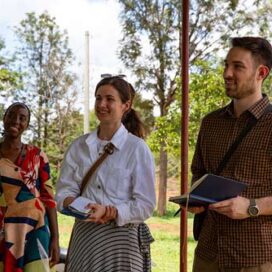Global EMBA Students Tackle Business Challenge in Singapore
Collaboration with hotel company aims to drive rural economic development for communities in need
Published: July 9, 2024 / Author: Angela Sienko
A cohort of 24 Notre Dame Executive MBA students recently embarked on a transformative 10-day immersion in Singapore as part of a three-credit elective designed to equip them with innovative frameworks and strategies to tackle global business challenges. The course, Global Finance Practicum, is led by Gianna Bern, the associate dean for the Notre Dame MBA and academic director for the Global EMBA.

In June, Professor Gianna Bern took 24 Global EMBA students to Singapore for Electives Week.
Bern explained the course’s unique offering: “One thing we hear from our students is that they have to be very senior in their organization before they get that tap on the shoulder to go to another part of the world and lead,” she said. “By expanding our Global EMBA curriculum with more global offerings, like this immersion in Singapore, we’re giving our students international experience, ensuring they emerge as capable and confident global leaders.”
During this year’s June immersion, the students collaborated with Lifestyle Retreats Management Company, an organization dedicated to rural economic development that leverages local resources and skilled workers to foster community growth. The partnership was arranged with the help and expertise of the Mendoza College of Business Experiential Learning team, which is led by Megan Piersma.
“Megan’s team did an outstanding job of navigating the complexity of the logistics and finding academic partners for the program,” Bern said. “Indeed, we are very grateful to Megan and her team.”

Lifestyle Retreats has accommodations around the world, including Bali.
Lifestyle Retreats, founded by Jose Luis Calle, is a global collective of tourism professionals committed to innovative, sustainable, and ethical hotel and resort management. With a mission to respect local traditions, support the environment, and promote community development, the company hires locals and nurtures their professional growth and welfare.
As part of the course, Executive MBA students helped Calle discern the best location and cost structure for his next redevelopment project. The countries he explored were Indonesia, Singapore, Portugal, and Spain. Calle, originally from Spain, now resides in Portugal but operates extensively in Singapore, reflecting his deep understanding of these regions.
“While Calle is the CEO of his company, it’s pretty much a one-man show, so our students acted as his business team,” Bern said. “Students will analyze these countries’ economic environments, cost structure, and potential partnerships to determine the most viable option. The final deliverables were a comprehensive investor presentation for potential investors and a robust financial model for the leadership team to assess their project development costs.

Villa overlooking the rice fields in Canggu on the south coast of Bali.
Calle’s vision is to redevelop rural properties, especially those in a post-COVID landscape where many buildings in rural areas are abandoned. “These are areas with a high population of seniors, but the community centers have closed, the restaurants have closed, schools have closed, and families have moved away. So we have seniors with little to no community,” Bern said. “They need resources, so Calle will look at rehabilitating these kinds of properties – many of which have been abandoned – and help rebuild some of these communities. I like to think it’s a little bit of growing the good.”
Before arriving in Singapore, students participated in Zoom sessions with Bern and the Experiential Learning team to understand the project’s framework. During the immersion, they worked in teams, each tackling a specific area, such as cost structure, economic development, operations, fundraising, sustainability issues, and potential economic, governmental, or private partners.
“At the end of the project, our students created a viable investor presentation that Calle can share with his partners and investors before ultimately presenting to the European Economic Commission on Rural Redevelopment,” Bern said. “I expect we will provide him with sound analysis and solid recommendations. We believe that all Global EMBA students came away with a deep understanding of and appreciation for cultural differences and global business complexities. Today, virtually every industry is operating in a global environment.”
The Experiential Learning team facilitated the collaboration with Lifestyle Retreats, identifying Calle’s organization as an ideal partner, combining innovative tourism with community development, perfectly aligning with the newly reimagined Notre Dame Global EMBA program’s goals. “The Experiential Learning team and the Austral Education curated a wonderful balance of cultural experiences within a very busy academic experience,” Bern said.
Tailored to the needs of working professionals, the Notre Dame Global EMBA is delivered through a 22-month program with monthly in-person sessions at Notre Dame and three global immersions across Europe, Asia, and South America. The Asian immersion – like this one in Singapore – is the second international immersion of the EMBA curriculum. It occurs between Year 1 and Year 2 of the program and involves partnering with an international organization or company to solve a specific business problem. Each step in the Global EMBA process builds upon the previous one to reinforce leadership, fundamentals, and strategy – the three cornerstones of the program.
Learn more about the Notre Dame Global EMBA.
Related Stories



